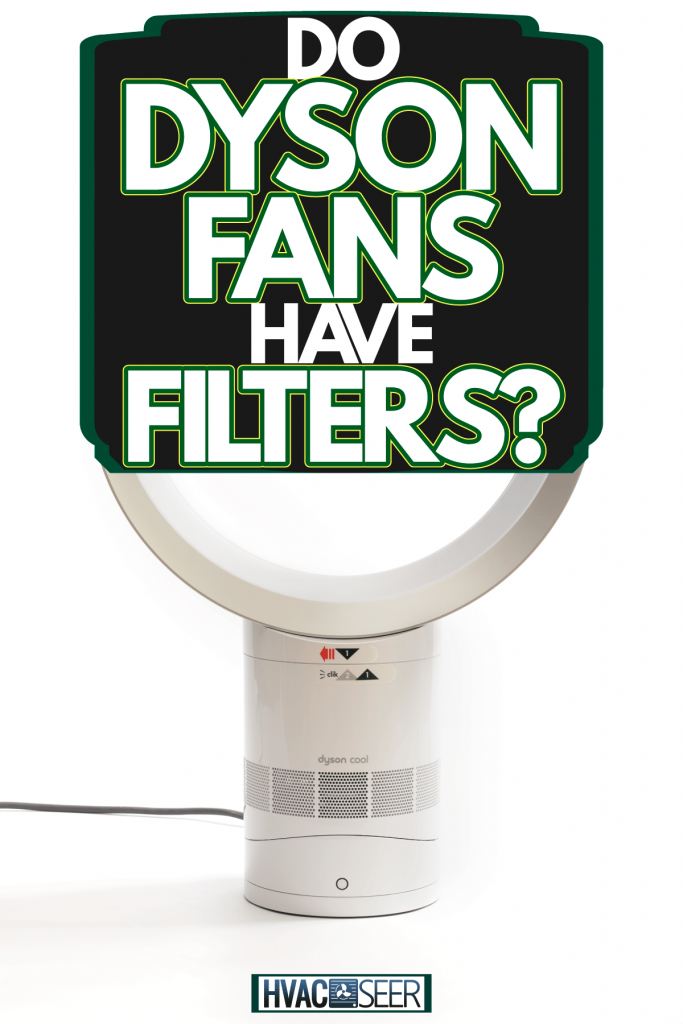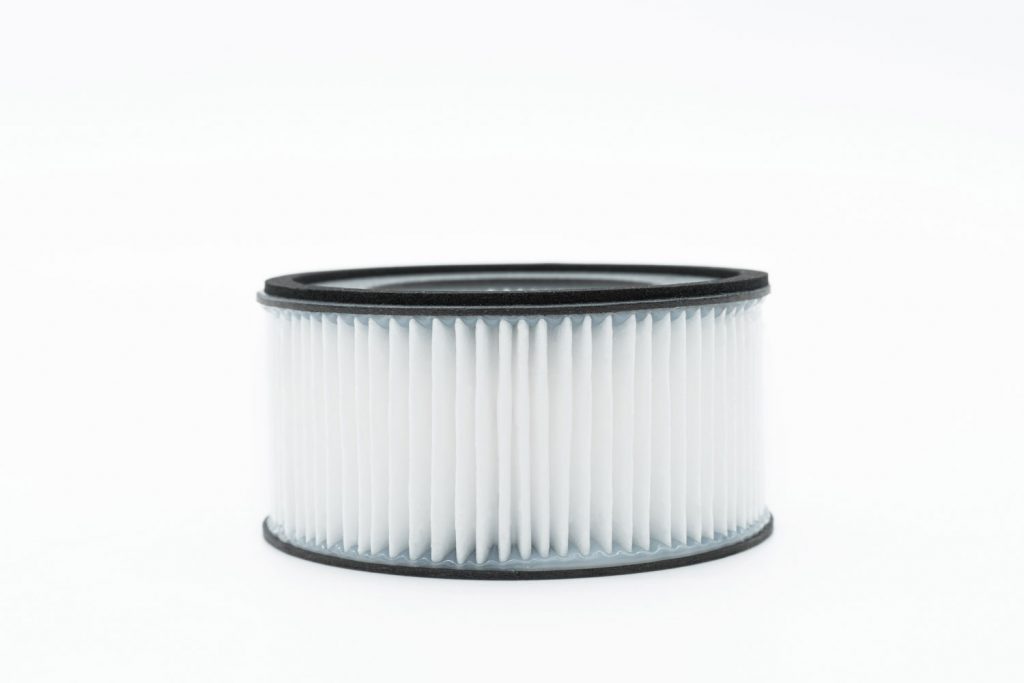Dyson fans have become very popular in recent years. They're known for their air-purifying qualities, but does that mean it has a filter that needs replacing? We have done plenty of research to find you the answers.
Dyson fans will have a built-in filter located near their base. Although you can't see them, Dyson does use either a replaceable or washable filter in their fans, which you will need to clean or switch out every so often. To do this, follow these steps:
- Turn off your fan and disconnect it from its power source
- Remove your fan's filter from its base
- Rinse your filter (if reusable) in cold water
- Let your filter dry for 24 hours in a warm place
- Insert your dry or new filter and reconnect your fan to its power source
As we begin, we will cover all things Dyson fans. Whether you have other Dyson products or are new to the brand, we've got you covered. With that said, let's dive right into this topic!

How Do I Know My Dyson Fan Needs A New Filter?
You will know your Dyson fan needs a new filter when a red flashing button appears toward the base of your device. Most times, this signal will indicate your fan's filter needs cleaning/replacing each time you turn your fan on, so you can't miss it.
Another way to know when to change your fan's filter is by checking the Dyson Link app, which keeps you updated on all of your paired devices.
How Often Should You Change A Dyson Fan Filter?
Usually, you can expect to change the filter in your Dyson every 12 months. Dyson recommends doing this each year to ensure that the air you breathe is as clean as possible, even if your device doesn't tell you it needs a new filter.
Over time, pollutants can build up in your fan, which causes lower-quality airflow and even odors to arise, so regularly replacing its filter is essential. That goes for any fan, regardless of brand, so make sure to keep track of your filter's age.
How Long Do Dyson Fan Filters Last?
You can expect a Dyson fan filter to last you around a year, or 4,000 hours. Dyson calculates this based on a 12-hour daily use estimate, so if you don't use your fan that much, expect your filter to last a bit longer.
That said, it's always a good idea to replace your fan's filter every 12 months, regardless of how often you turn it on. Even a fan that is off can collect dust and pollutants, so your filter is never truly at rest.
Can You Wash A Dyson Fan Filter?
As long as your Dyson fan filter can get wet, washing it every so often is a great idea. Your fan's filter will usually have a symbol or instructions on how/if you should clean it, but you can always check on the Dyson website under your fan's product description to make sure.
To wash your fan's filter, do the following:
- Turn on your sink to cold
- Place your filter under the running water
- Gently squeeze the water from your filter
- Repeat this process until your filter is clean/the water coming through it is clear
Why Does My Dyson Fan Stink?
For anyone experiencing a stinky Dyson fan, this is probably due to an old filter. Like we mentioned earlier, pollutants can build up in your fan's filter, causing it to smell pretty sour.
According to Dyson's support page, a stinky fan could also be due to a blockage in your fan's inlet holes, so make sure to take a look at your device. Before inspecting, we recommend unplugging your fan and turning it off to avoid any electrical damage.
Cleaning A Smelly Dyson Fan Tutorial
Here is a video tutorial on sanitizing a stinky Dyson fan from Magic Smoke's official ">YouTube channel. This video explains how to clean the exterior section of your Dyson and gives helpful insight into keeping future odors away.
Can I Add A HEPA Filter To My Dyson V7?
For anyone wanting to add a HEPA filter to their Dyson V7, this is certainly doable. Generally, you want to find a HEPA filter that comes with an adapter because you will need to replace the current one on your V7 vacuum.
Although we recommend going through Dyson for your actual HEPA filter, there are plenty of bundles online that include V7 adapters, so you've got options. Regardless, try to be careful when replacing your current V7 back filter with a HEPA so you don't damage your vacuum.
Adding A HEPA Filter To Dyson V7 Tutorial
Here is a helpful video tutorial on adding a HEPA filter to your Dyson V7 from Engineerable's official ">YouTube channel. This video covers how to replace your V7's current filter with a HEPA option and gives helpful insight into doing this without damaging your vacuum.
Motor Rear Cover Replacement for Dyson V7
This rear motor cover works with Dyson V7 and V8 models, is easy to remove, and is compatible with HEPA filters.
See this rear motor cover on Amazon here.
VEVA 2 Premium Vacuum HEPA Filters Set
This set of two HEPA filters is compatible with Dyson V7 and V8 models, premium quality, and has great online customer reviews.
Click this link to view them on Amazon.
What Does A HEPA Filter Do?

When it comes to what they do, HEPA filters essentially work to remove pollutants and bacteria from the air. According to the EPA, HEPA filters can remove around 99.97% of dust, pollen, mold, bacteria, and any other airborne particles from the air, which is impressive.
HEPA filters are also beneficial for those with seasonal allergies and other breathing problems because they filter and improve the air quality around them. On top of that, HEPA filters also work in most vacuums, fans, and air purifiers, so they might be worth checking out.
How Do I Know If My Dyson Has A HEPA Filter?
The best way to figure this out is to take a look at your device. HEPA filters will often have a serial number that states they meet specific particle absorption standards, which will be on the side or bottom of your filter.
Many Dyson products come equipped with HEPA filters, including their replacement options, so you can expect to get a certified HEPA filter if you purchase directly from Dyson.
Are Dyson Fans Better Than Regular Fans?
When it comes to Dyson fans being better than other options, we agree that this is true. Dyson fans are easier to clean and maintain than traditional fans are, which makes them a great choice.
On top of that, Dyson fans don't have grills or blades that gather dust, creating better air quality in your space. Furthermore, Dyson fans also feature remote control use, various airflow settings, and sleep timers, making them stand out.
Dyson Cool AM07 Air Multiplier Tower Fan
This tower fan is corded electric, uses patented air multiplying technology, has a two-year parts warranty, has a sleep timer, remote control, and comes in two colors.
Follow this link to see it on Amazon.
Are Dyson Fans Worth The Money?
Value-wise, we do think that Dyson fans are worth the money. Although they can be higher in price, Dyson has revolutionized the way we see and use technology, including their vast line of fans.
Most notably, Dyson created a quiet and powerful fan, which many brands haven't been able to accomplish. Dyson also designs their fans to be as child-friendly as possible, which gives you the peace of mind they won't get hurt touching a blade.
To Wrap Things Up
Whether you have a Dyson fan or want to purchase one, it is essential to figure out how/if you need to change its filter. Dyson fans will have a filter, usually located towards their base, which will be either replaceable or washable.
When it comes to changing your fan's filter, you want to turn it off and disconnect it from its power source before getting started. Filter-wise, Dyson does offer HEPA-certified products and replacements, which we think are worth looking into. Regardless of your fan's brand, make sure to change its filter every 12 months, and don't forget to keep an eye out for a blinking replacement light or notification from your Dyson Link app.
Need more Dyson fan content? Check out these super helpful HVAC posts below!
Can A Dyson Fan Replace An Air Conditioner?



